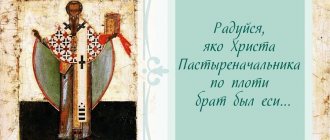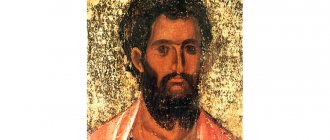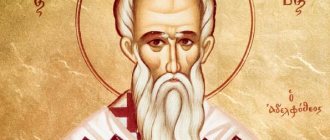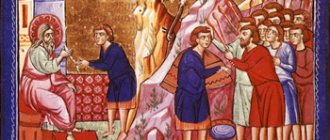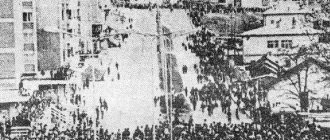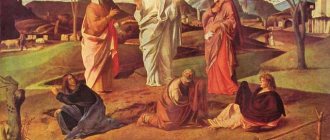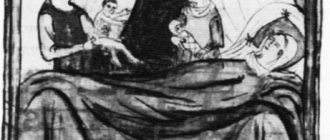In 1994, at the request of Irina Allegrova, Igor Krutoy wrote music for the famous poem by M. Tsvetaeva “I will win you back...”. It immediately became a hit, but not every listener was able to appreciate the deep meaning of the work of the famous poetess of the Silver Age. In particular, many of those new to the Bible have asked the question: “Who did Jacob stand with in the night?” Indeed, in the Old and New Testaments several individuals with this name are mentioned. So who did Tsvetaeva mean, and with whom did the patriarch, from whom the 12 tribes of the people of Israel descended, communicate under the cover of darkness?
Jacob, son of Isaac
The first mention of a person with this name is found in the Old Testament, more precisely in the Book of Genesis. There, Jacob is presented as the youngest of the twin brothers born to the patriarch Isaac from his wife Rebekah. With the help of his mother, he managed to deceive his half-blind father and receive his blessing for the birthright. He paid for his actions throughout his life. In particular, fearing his brother's revenge, Jacob fled to Haran, where he married two sisters, serving 14 years for them. They, along with the maidservants Zilpah and Bilhah, bore him a total of thirteen children. When Jacob returned from self-imposed exile, his only daughter was dishonored by the king of Shechem. Her brothers, in response to such an insult, carried out a massacre and took revenge on the inhabitants of the city.
With whom did Jacob stand in the night?
Years have passed. One night Jacob could not sleep at night, thinking about the misadventures that had befallen him. Suddenly God appeared before him in the guise of an angel. On the verge of despair, the patriarch began to fight with the messenger of higher powers, demanding a blessing until dawn. The fight was merciless, and the angel even wounded him in the thigh. However, Jacob’s zeal was appreciated by God, and he not only blessed him, but also gave him the ability to “overcome men.” In addition, the angel gave him a new name - Israel, meaning “wrestling with God.” It was supposed to remind of who and what Jacob fought for in the night. From that time on, Israel's life changed: he returned to his father's house, received his father's forgiveness and attended his funeral. Even the sale of his beloved son Joseph into slavery by his own brothers ultimately turned out to be a triumph for Jacob, as he took an important post in Egypt and, calling his father and relatives under his wing, allocated the rich district of Goshen for them to live.
Thus, the biblical story associated with the name of the patriarch of Israel may cause surprise. After all, the one with whom Jacob stood in the night and wrestled was the Most High himself, and in the New Testament, and in the Old as well, the call to obey the will of the Lord unquestioningly is constantly repeated.
Analysis of the poem “I will conquer you from all lands, from all heavens...” by Tsvetaeva
The poem “I will conquer you from all lands, from all heavens...” (1916) is one of the most vivid expressions of female love in poetry. Tsvetaeva was able to describe this boundless feeling with great power and expressiveness. The poetess was often criticized for such an immoderate expression of love, citing the fact that only a man in love is capable of such a feeling. Of course, the criticism was male. Tsvetaeva’s work simply did not fit into traditional ideas about love with the absolute superiority of the masculine principle. Researchers believe that the poetess is polemicizing with Blok’s Don Juan. Some lines of the poem are an obvious dialogue with Blok’s lyrical hero.
Tsvetaeva immediately declares her full right to her lover. This right was given to her from above as a merit for her great love. The poetess claims that this feeling allows her to rule over the whole world, freeing her from physical dependence (“I stand on the ground with only one foot”). Under the influence of love, the heroine is even able to control time and space at will. She hints that she will find and take possession of her beloved in any historical era on earth and in heaven. No one can hold her back or stop her. If another woman stands in the heroine’s way, she will break earthly laws and enter into a “final dispute” with God himself. Tsvetaeva doesn’t even give a man the right to choose (“shut up!”). She is confident that she can win the sacred duel.
In the last stanza, the heroine warns that her last resort will be the murder of her loved one, after which their souls will merge forever. She bitterly admits that the man is too much attached to earthly existence. The poetess uses antithesis to show the difference between them. The “cradle and grave” of a man is the earthly world, while its beginning and end is the forest, symbolizing a free life without any restrictions (perhaps referring to the ancient Greek goddess Artemis). The murder of a lover will only be his physical death, which will remove earthly shackles from him and allow him to be reborn in a new spiritual form.
Tsvetaeva’s poem has become a symbol of boundless female love, sweeping away all barriers and laws in its path. Few poetesses were able to express their feelings to the same extent and shake the unshakable dominance of male love lyrics.
Son of Zebedee
The name Jacob appears several times in the New Testament. So, Jesus meets three fishermen - Zebedee and his sons, James and John. Subsequently, the young men become apostles, and the first of them is called the Elder, to distinguish him from other followers of the Savior with the same name. How close Jacob, the son of Zebedee, was to Christ is evidenced by the fact that he was one of the three disciples who witnessed the Transfiguration of the Lord. As for his actions after the Savior’s ascension into heaven, it is known that he participated in the organization of the first Christian communities. And the Apostle James died in the year 44, being put to death by King Agrippa the First.
09.11.2005Who did Jacob wrestle with at Penuel?
Fedor Goev.
The episode of Jacob's struggle with an unknown night enemy at Penuel (Gen. 32:24-32) is usually considered one of the most mysterious, enigmatic and incomprehensible in Holy Scripture. Following the prophet Hosea (Hosea 12:3-4), both Jewish and Christian traditions call Jacob’s adversary either the Angel of God, or God himself, or both at the same time. Such interpretations do not explain the mysterious scene, but confuse and mystify it even more, raising only a lot of unanswered questions: how, why and for what purpose is a person’s struggle with the Creator or an incorporeal Angel possible? What does it mean to see the face of God? The Russian Synodal translation of this episode contains fundamental errors and thereby completely obscures the meaning of the story.
Verse 28 in the Synodal translation looks like this: And he said: From now on your name will not be Jacob, but Israel; for you have fought with God, and you will overcome men.
This is an undoubted distortion of the Hebrew original: For you fought with God and people and prevailed (ed.).
The meaning of the phrase is not to fight with God and overcome people, but to fight with God and people and overcome. During the time of Patriarch James, it was considered a common idea that a person is tempted not only by people and circumstances, but also by God himself (in contrast to the Apostle James, who said that God is not tempted by evil and does not tempt anyone Himself, James 1:13). Grammatically, in the sentence under consideration, the words God and people are homogeneous additions to the predicate fought, which is in the past tense. The word overcame, overcame, turned out to be able to stand in the present tense, and not in the future, as in the Synodal translation. Thus, verse 28 of the Synodal translation does not allow the interpretation that you fought with Me, God, and won, i.e. does not at all refer to the person of Jacob’s adversary. This is confirmed by the fact that when talking about the fight with God, the text calls the verb to fight, resist, and when talking about the fight with the night stranger, the verb is to fight in the dust.
In verse 24, for the only time in the entire text, Jacob's opponent is definitely called by a noun and the man wrestled with him. The word does not have a definite article, so it can be translated by a person or a certain person, but the text does not give any reason to write this word in Russian with a capital letter. The word does not mean either Angel, or God, or Someone.
Verse 30 requires special consideration, where Jacob says that he saw God face to face. How can we understand this, since it is impossible for humans to see God? The text allows us to answer this question without mystical interpretations. Of course, it is impossible to definitely name the identity of Jacob’s night enemy, since he did not reveal his name. Moreover, in the Hebrew text of the original there is no postscript that appeared in the LXX, and then in the Slavic and Russian translations, that his name is wonderful. This is an artificial and inappropriate parallel with Judges 13:18. As for the identity of the defeated enemy, we can only assume that it was one of Laban’s men. More specifically, the text states that the words I saw God face to face were spoken by Jacob after receiving a blessing from his enemy. In this regard, it is appropriate to remember how zealously Jacob treated the blessing, how highly he valued and valued it (Gen. 27:35). A blessing is a prayerful appeal to God invoking His mercy and grace for a given person. Having received the blessing demanded from the stranger-enemy, Jacob felt a real and real influx of grace, which allowed him to utter the words as if he had seen the face of God Penuel.
The text of the Torah gives no reason to consider Jacob's adversary to be either God or an Angel. The current interpretation is the fruit of a tradition adopted by Christian theologians from the Jews. Hosea 12:2-4, quoted above, is not a prophecy, but is a reference to a tradition that had apparently already taken root in the people of Israel during the time of the prophet. It is noteworthy that the rabbinical translation of the Torah into Russian traditionally conveys the meaning of the word in verses 28 and 30 as an Angel, but not as God: I saw an Angel face to face. It seems to me that the simple human meaning of the night battle that took place on the banks of Jabbok gave way in the minds of the people to a mystical and almost mythological perception of this episode. The legendary interpretation of the duel is easily explained due to its special significance, since it was during it that Jacob received the name Israel, which subsequently gave the name to the people and the state.
D. Shchedrovitsky. Review of F. Goev’s article “The Veil on One Biblical Text.”
An interesting article by Fyodor Goev, published in the journal Orthodox Community No. 2, will attract the attention of everyone interested in interpreting the text of the Bible. The very fact of the appearance of this article is encouraging, since theological studies of the Hebrew original of the Old Testament, periodically published by Russian Orthodox theologians of the 19th and early 20th centuries, have become extremely rare in Russia in our time, and are almost completely absent from more or less popular literature.
However, for the sake of completeness of the picture, I would like to express a different point of view on the subject considered by F. Goev.
In saying that Jewish commentators on the Book of Genesis saw Jacob’s rival (Genesis 32:23-32) as an Angel, not God, F. Goev is absolutely right. However, from his article it is not clear which Angel the authors of the rabbinic commentaries had in mind. And this is very important for understanding both the history of Jacob’s struggle and the point of view of its ancient interpreters. Most Jewish commentators agree that Jacob fought with the patron angel of Esau-Edom, who did not want to let Jacob into the Holy Land. The view that in order to defeat an opponent it is enough to defeat his master spirit still exists among many peoples. Since Jacob, in the eyes of the most ancient interpreters of the Book of Genesis, symbolized the entire people of the Jews of his descendants, it is clear that the patron angel of Esau was viewed as a supernatural prince-protector of the people of Edom (cf., for example, with the Lord’s promise in the Book of Exodus 12:12 to fulfill judgment of the Egyptian gods during the defeat of the Egyptians; cf. also the words about the patron angels of Medo-Persia and Greece in the Book of Daniel 10,13 and 20). This is exactly how Jacob’s struggle with the Angel is understood by Rashi, Ramban, Rashban, Sforno, the authors Siftei Hachamim, Baal Haturim, Keli Yakar and other Jewish interpreters of different centuries and countries.
The fact that Jacob's rival was already considered in ancient times as an Angel, and not God, can be indicated by the parallel name of him in the prophet Hosea Elohim and Malakh (Divine being and Angel, or messenger Hosea 12:3-4). As is known, the name Elohim is applied in the Bible not only to God, but also to Angels and spirits in general (for example, 1 Kings 28:13; Ps 81 (82), 6; Ps 94 (95), 3; Ps 96 (97 ), 7, etc.). Jewish commentators give the verse of Hosea (12:4), which mentions the struggle of Jacob, a different meaning than the Russian synodal translation: they attribute the words he cried and begged him to the Angel, and not to Jacob. After all, according to Gen. 32:26, it was the Angel who begged Jacob to let him go, for the dawn had risen. And the following words of Hosea (12:4-5) are understood by these interpreters as the Angel’s address to Jacob: In Beth-El (Bethel) He will find you, and there He will speak to us (that is, God will speak to Jacob and the patron Angel of Esau , as if confirming the victory of Jacob and his right to the Holy Land).
Indeed, it was in Bethel that God subsequently appeared to Jacob and confirmed the change of his name to Israel (Gen. 35:9-15). If God Himself had wrestled before and called it Israel immediately after the struggle, then what was described in Genesis 35 would simply duplicate the narrative of Chapter 32. Genesis.
Jacob's mysterious rival could not have been a man from Laban's family, since Jacob made a sworn peace with Laban and all his people just before his night struggle (Gen. 31:43-55). And, although the one who fought with Jacob is called ish (husband, or someone), the word ish in the Bible is often used to refer to Angels (cf. Joshua 5:13; Zech 1:8-11; Dan 10:5-6, etc.) .
Let us also note that the synodal translation of the words of the Angel to Jacob in the past tense is correct, since the construction indicates the future tense (you will overcome), and with vav it forms the past tense (you have overcome). However, apparently the following translation would be more adequate to the original: For you fought with Angels (Elohim) and people, and you prevailed, since Elohim and Anashim (men, people) are parallel forms here.
Jacob’s struggle with Esau’s patron angel can also be evidenced by the words he uttered when meeting with his brother: I have seen your face, as they see the face of an Angel (Elohim), and you have favored me (Genesis 33:10). In these words one can see a reference to the favor Jacob received from the Protecting Angel Esau the previous night. And the very peaceful nature of the meeting between two rival brothers, which contrasts so much with Jacob’s anxious expectations (cf. Gen. 32:6-11 and 33:1-4), can be explained as the result of Jacob’s previous spiritual victory over the Protective Angel of Esau...
Let us add that already the most ancient Jewish commentators accepted the Angel’s request to let him go, for the dawn had risen, as an indication that he should praise the Lord at sunrise along with the choir of other Angels.
Thus, there is an ancient interpretation that holistically and coherently explains our text in all its details.
But, of course, the text itself is incomparably deeper than any of its interpretations. It is enough to recall at least such mutually dissimilar and diverse artistic interpretations of him as the paintings of Rembrandt and Delacroix, Rilke’s poem Der Schauende and many others, not to mention the allegorical and exegetical comments of different centuries and confessions.
Therefore, our differences regarding this Biblical text are only a timid attempt to remind us of its inexhaustible ambiguity.
_________________________
Who did Jacob wrestle with at Penuel?
(Review to F. Goev’s article “The Veil on One Biblical Text”) https://shchedrovitskiy.ru/JamesInPenuele.php
An interesting article by Fyodor Goev, published in the journal “Orthodox Community” No. 2, will attract the attention of everyone interested in interpreting the text of the Bible. The very fact of the appearance of this article is encouraging, since theological studies of the Hebrew original of the Old Testament, periodically published by Russian Orthodox theologians of the 19th - early 20th centuries, have become extremely rare in Russia in our time, and are almost completely absent from more or less popular literature.
However, for the sake of completeness of the picture, I would like to express a different point of view on the subject considered by F. Goev.
In saying that Jewish commentators on the Book of Genesis saw Jacob’s rival (Genesis 32:23–32) as an Angel and not God, F. Goev is absolutely right. However, from his article it is not clear which Angel the authors of the rabbinic commentaries had in mind. And this is very important for understanding both the history of Jacob’s struggle and the point of view of its ancient interpreters.
Most Jewish commentators agree that Jacob fought with the patron angel of Esau-Edom, who did not want to let Jacob into the Holy Land. The view that in order to defeat an opponent it is enough to defeat his master spirit still exists among many peoples. Since Jacob, in the eyes of the most ancient interpreters of the Book of Genesis, symbolized the entire people of Judah - his descendants, it is clear that the patron angel of Esau was seen as the supernatural “prince-protector of the people of Edom” (cf., for example, with the promise of the Lord in the Book of Exodus 12 , 12 “to execute judgment on the gods of Egypt” in the defeat of the Egyptians; cf. also the words about the patron angels of Medo-Persia and Greece in the Book of Daniel 10, 13 and 20). This is exactly how Jacob’s struggle with the Angel is understood by Rashi, Ramban, Rashban, Sforno, the authors of “Siftei Hachamim”, “Baal Haturim”, “Keli Yakar” and other Jewish interpreters of different centuries and countries.
The fact that Jacob’s rival was already considered in ancient times as an Angel, and not God, can be indicated by the parallel naming of him by the prophet Hosea “Elohim” and “Malakh” (“Divine being” and “Angel”, or “messenger” - Hosea 12, 3–4). As is known, the name “Elohim” is applied in the Bible not only to God, but also to Angels and spirits in general (for example, 1 Kings 28:13; Ps 81 (82), 6; Ps 94 (95), 3; Ps 96 (97), 7, etc.). Jewish commentators give the verse of Hosea (12:4), which mentions the struggle of Jacob, a different meaning than the Russian synodal translation: they attribute the words “he wept and begged him” to the Angel, and not to Jacob. After all, according to Gen. 32:26, it was the Angel who begged Jacob to let him go, “for the dawn had risen.” And the following words of Hosea (12:4-5) are understood by these interpreters as the Angel’s address to Jacob: “He will find you in Beth-El (Bethel), and there he will speak to us” (that is, God will speak to Jacob and the Angel - patron of Esau, as if confirming the victory of Jacob and his right to the Holy Land).
Indeed, it was in Bethel that God subsequently appeared to Jacob and confirmed the change of his name to Israel (Gen. 35:9-15). If God Himself had wrestled before and called it Israel immediately after the struggle, then what is described in Gen. 35 would simply duplicate the narrative of Chapter 32. Genesis.
Jacob’s mysterious rival could not have been “a man from the family of Laban,” since Jacob made a sworn peace with Laban and all his people just before his night struggle (Gen. 31: 43–55). And, although the one who fought with Jacob is called “ish” (“man”, or “someone”), the word “ish” in the Bible is often used to refer to Angels (cf. Joshua 5:13; Zech 1:8-11; Dan 10, 5–6, etc.).
Let us also note that the synodal translation of the words of the Angel to Jacob in the past tense is correct, since the construction לכות indicates the future tense (“you will overcome”), and with the “vav” לכותו it forms the past tense (“you have overcome”). However, apparently, the following translation would be more adequate to the original: “For you fought with the Angels (‘Elohim’) and with men, and prevailed,” since “Elohim” and “anashim” (“men”, “people”) are here - parallel forms.
Jacob’s struggle with Esau’s patron angel can be evidenced by the words he uttered when meeting his brother: “I saw your face as they see the face of an Angel (“Elohim”), and you favored me” (Gen. 33:10). In these words one can see a reference to the favor Jacob received from the Protecting Angel Esau the previous night. And the very peaceful nature of the meeting between two rival brothers, which contrasts so much with Jacob’s anxious expectations (cf. Gen. 32:6–11 and 33:1–4), can be explained as the result of Jacob’s previous “spiritual victory” over Esau’s protecting angel ...
Let us add that already the most ancient Jewish commentators accepted the Angel’s request to let him go, “for the dawn has risen,” as an indication that he should praise the Lord at sunrise along with the choir of other Angels.
Thus, there is an ancient interpretation that holistically and coherently explains our text in all its details.
But, of course, the text itself is incomparably deeper than any of its interpretations. It is enough to recall at least such mutually dissimilar and diverse artistic interpretations of him as the paintings of Rembrandt and Delacroix, Rilke’s poem “Der Schauende” and many others, not to mention the allegorical and exegetical comments of different centuries and confessions.
Therefore, our differences regarding this Biblical text are only a timid attempt to remind us of its inexhaustible ambiguity.
Jacob - brother of the Lord
Another character in the Bible with this name is the son of Joseph, to whom the Virgin Mary was betrothed. In church tradition, he is usually called the Lesser Apostle James, and he is considered the brother of Christ in the flesh. As a child, he accompanied Mary, Joseph and the baby Jesus on the flight to Egypt, and later became the first hierarch of Jerusalem. In addition, the epistle of James is known, in which he writes about how to obtain wisdom and about the joy of enduring temptations. He also owns the famous phrase “Faith without works is dead,” which is one of the most quoted truths given in the Bible.
Evidence has been preserved of the tragic death of Saint James, son of Joseph. In particular, it is known that around the year 63, on the Jewish Passover, the scribes and Pharisees decided to discredit Christ in the eyes of the people and asked his already elderly brother to climb onto the roof of the temple and explain to people that Jesus is an ordinary person and is not a savior. Jacob went up to where he was shown and spoke the truth from on high without fear. For this they pushed him down and stoned him, and until the last second he prayed and glorified the Lord.
Now you know with whom Jacob stood in the night. And, perhaps, the song that Igor Krutoy wrote twenty years ago based on the poems of Marina Tsvetaeva will take on a completely different meaning for you.
